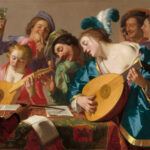1 PM Preconcert Talk: Byron Adams
1:30 PM Performance: Rieko Aizawa, piano; Daedalus Quartet; César Delgado, tenor; Margaret Dudley, soprano; Theo Lebow, tenor; Jesse Mills, violin; Kelly Newberry '16, mezzo-soprano; Thomas Kraines, cello; Christopher Oldfather, harpsichord; The Orchestra Now, conducted by Zachary Schwartzman; and others
Giacomo Puccini (1858–1924), Salve del ciel regina (c. 1883); Giuseppe Tartini (1692–1770), Sonata in G Major, Op.6, No.1 (c.1731); selections from Arie antiche, edited and arranged by Alessandro Parisotti (1853–1913), and works by Claudio Monteverdi (1567–1643), edited by Gian Francesco Malipiero (1882–1973); Chiome d'oro (1619) (anon.), Zefiro torna (1632) (anon.); Ottorino Respighi (1879–1936), Antiche danze ed arie per liuto, Suite No. 1 (1917), from Quattro liriche (1920); Gian Francesco Malipiero (1882–1973), String Quartet No.3, "Cantari alla madrigalesca" (1931); Alfredo Casella (1883–1947), from Il pezzi infatili, Op.35 (1920); Luigi Dallapiccola (1904–1975), Tartiniana, divertimento for violin and orchestra (1951); Domenico Scarlatti (1685–1757), Sonata in E Major, K.380 (n.d.), Sonata in D Major, K.492 (n.d.)
The vogue for unearthing music of bygone eras – spearheaded by Mendelssohn's Bach revival – found expression in Italy too. Straddling past and present, the vocal writing in Puccini's student composition Salve Regina anticipates his opera arias (indeed, he reused the hymn in Le Villi), while its organ accompaniment pays homage to Italy's glorious liturgical tradition. Alessandro Parisotti's anthology Arie antiche is primarily composed of Romanticized arrangements of 17th- and 18th-century song, but also includes "Se tu m'ami," which – while attributed to Baroque master Giovanni Pergolesi – appears to be his own original work. The musicologist behind the first complete edition of Claudio Monteverdi's oeuvre was Malipiero, who drew on the sophisticated polyphony of Italy's madrigal tradition in his own Third String Quartet. Another scholar of Italy's musical past was Respighi, who published editions of works by Monteverdi, Vivaldi and Benedetto Marcello, and who based the first orchestral suite of his own Ancient Airs and Dances on lute pieces by Vincenzo Galilei, father of Galileo, and other composers of the Italian Renaissance. Similarly, the fifth of Casella's II Pezzi infantili is specified as an homage to the five-finger exercises of Classical pedagogue Muzio Clementi, while Luigi Dallapiccola's fascination with the Baroque inspired Tartiniana No. 1, a violin concerto based on the music of Giuseppe Tartini.

